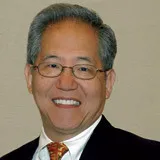Leonard Nakamura '69

Nakamura is head of the regional and applied economics section of the Economics Research Department of the Federal Reserve Bank of Philadelphia. He does academic research on finance, information, and economic measurement and advises on financial and monetary policy.
I had spent the year 1966-67 on New York City's Lower East Side, part of it doing community development work with Colin Connery '67 and Lindsay Richards '69. Back on campus in fall 1967, I had the good fortune to take the first edition of Bernie Saffran's legendary seminar on economic theory and then a terrific economics seminar that combined econometrics and linear optimization under Bernie and mathematics professor Gene Klotz. But I had the bad fortune to have two math exams from courses that I had taken as a freshman on my honors exam schedule, and I flunked one of them.
As a teacher - first an assistant professor at Rutgers, and later as a part-timer at Wharton, Swarthmore, and Bryn Mawr, I became aware of how much of the hard work of teaching is associated with giving grades. In teaching honors seminars, the Swarthmore faculty were privileged to avoid that task when I was a student. But the privilege cuts both ways. I have known seniors who defied their departments in doing honors and went on to get highest honors when their departments would have called them mediocre at best. I have also known students who were expected to get highest honors only to run afoul of the wrong examiner.
Honors exams occasionally have brought in jobs as well as examiners. Paul Courant '68, a housemate of mine, was an honors history major with an economics minor. Nevertheless, his honors economics papers were of such high quality that one of his examiners offered him a job working for the Council of Economic Advisers. And although I didn't enter Princeton's graduate economics program until 1981, before that I worked as an economist at The Conference Board and for Citibank on the strength of my undergraduate training.
As a scholar in macroeconomics and financial economics, I was asked to be an outside examiner in honors in both fields. Setting the exams is an interesting and uniquely rewarding task - one sits in judgment simultaneously on the College curriculum and on a particular set of students. During one visit, I also wound up chairing the honors conference at which the outside examiners decide on honors, high honors and highest honors. In that role, I was able to set in motion some streamlining of the voting process, which had sometimes made the honors conference an ordeal, rather than an honoring and honest ritual. For those of us for whom the Swarthmore Honors Program was a great formative experience, being able to give something back is deeply satisfying.



